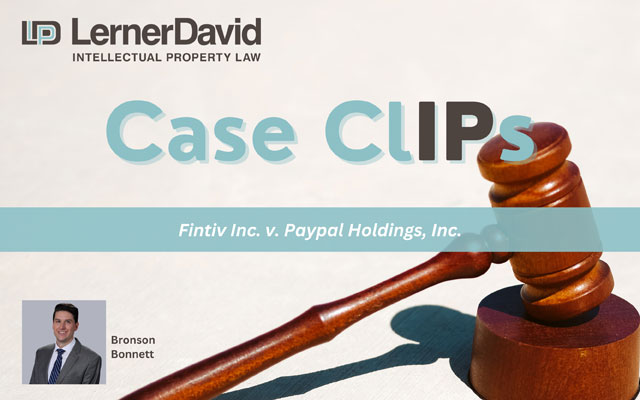
In Fintiv Inc. v. Paypal Holdings, Inc., Appeal No. 2023-2312 (Fed. Cir. Apr. 30, 2025), the Federal Circuit indicated that black box recitation of structure may operate as a substitute for means plus function under § 112 ¶ 6. Additionally, the Federal Circuit reiterated that there is no “blanket rule” that certain connecting words automatically incorporate structural characteristics into claims.
Fintiv Inc. (Fintiv) sued Paypal Holdings, Inc. (Paypal) alleging Paypal infringed U.S. Patent Nos. 9,892,386 (’386 Patent), 11,120,413 (’413 Patent), 9,208,488 (’488 Patent), and 10,438,196 (’196 Patent), the claims of which are directed to cloud-based transaction systems or mobile wallet systems. Claim 1 of the ’386 Patent, for example, recites “a payment handler operable to use [application programming interfaces (APIs)] of different payment processors,” and claim 1 of the ’413 recites “a payment handler configured to use APIs of different payment processors.” Outside of the claims, the only related support in the asserted patents for the payment-handler service was wording in the specification essentially identical to the language of the claims.
The district court found that the asserted “payment-handler” terms were drafted in a means-plus-function manner under § 112 ¶ 6. The district court further held that the asserted terms were indefinite because the asserted patents failed to disclose adequate structure corresponding to the claimed function. In particular, the district court found that the specifications of such patents “disclose no structure at all, much less an algorithm for performing the recited functions.”
On appeal, Fintiv argued that both the “payment-handler” terms by themselves and the “payment-handler” features as a whole identify structure. In particular, Fintiv argued that “operable to” and “configured to” are connecting words that are “more often used with structural terms rather than non-structural ones.” The Federal Circuit disagreed, emphasizing that there is no “blanket rule that [such] connecting words … automatically suggest terms are structural.” The Federal Circuit further found that the district court “correctly analogized ‘handler’ with the nonce term ‘module,’ which … [is] simply a generic term for software” and reasoned that “the payment-handler terms are no more than a ‘black box recitation of structure’ that can operate as a substitute for ‘means.’” In finding that there are no “details about an algorithm to carry out the functions” other than reciting the generic term in the specifications, the Federal Circuit affirmed that the terms are indefinite.